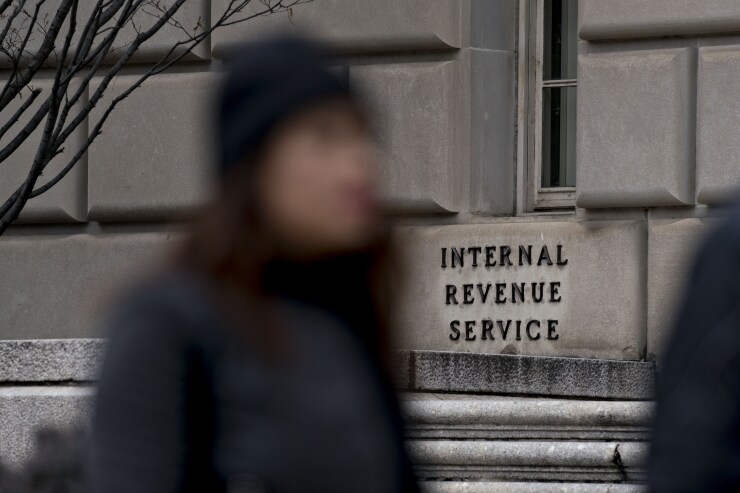The Internal Revenue Service is urging taxpayers to get ready now to file their 2022 tax returns, while also cautioning them to beware of the newly lowered threshold for receiving a Form 1099-K if they received payments amounting to as little as $600.
As a result of changes in the American Rescue Plan Act of 2021, Congress lowered the threshold for businesses to send the form from $20,000 to $600 this year (
"Taxpayers should report the income they earned, including from part-time work, side jobs or the sale of goods," said the IRS in an

Some groups are still hoping that Congress will act before the end of the year to roll back the threshold as part of a year-end tax deal, but that probably won't stop the forms from going out to taxpayers. The Coalition for 1099-K Fairness, a group of online marketplaces and digital payment companies, has been lobbying Congress hoping to see the provision included in year-end legislation during the lame-duck session. The coalition includes companies like Airbnb, eBay, Etsy, PayPal and Block Inc., the parent of Square and the Cash App. Ryan Ellis, president of the Center for a Free Economy and an IRS enrolled agent, has been working with the coalition and spoke during an online press conference last week discussing the issue.
"I'm looking at this primarily from a tax season perspective," he said. "I'm a preparer and have owned my own tax prep business for almost 20 years now. I also deal a lot with the IRS as an enrolled agent so I know what kind of challenges that entails. I think people are not necessarily prepared for the scope of the problem we're dealing with here."
He cited transactions through payment services Venmo, PayPal, Apple Pay, as well as gig economy sharing platforms, and sales platforms such as eBay, Etsy and Facebook Marketplace.
"Think about any interactions we have, for example, ticket exchanges for people who have college football tickets they might sell on a secondary market," said Ellis. "How many of those interactions do people have? If they're hitting $600, regardless of the number of transactions, they are very likely to get a 1099-K. That 1099-K could be indicative of income they have received. It could be, however, a false signal of income. The IRS might be expecting them to pay ordinary income taxes on what is in fact a capital gain, and there's no indication of basis, so the taxpayer is going to have to assert basis and adjudicate that with the IRS. In many cases, these are personal property sales, for example, of things that the taxpayer paid in excess of sale. That happens a lot with used property like used clothes or used lawn and garden equipment. You might sell that at a personal loss. That's never been reported on a tax return before, but the IRS is not only going to expect to see those types of things, they're going to have no insight into basis for the taxpayer and they'll have no insight in terms of any ordinary and necessary business expenses, for example, that a music instructor or a babysitter might have for getting these things. Nobody knows the number, but I think it's going to be on the upside. I think it's certainly going to be tens of millions of these 1099-K's, probably 20, 30 or 40 million of them. People are going to get several of them."
Several lawmakers have introduced legislation to roll back the requirement or up the threshold. Sen. Rick Scott, R-Florida, and Rep. Carol Miller, R-West Virginia,
"We lobby for a lot of interests, but I don't feel like we're necessarily competing with R&D or bonus or the Child Tax Credit," said Geoff Verhoff, a partner at the law firm Akin Gump, which is lobbying on behalf of the coalition. "On the merits, policymakers are going to be recipients of the downpour of bad effects if the [IRS] is further stressed with tens of millions of new forms that go to taxpayers who have no idea what they are. At the end of the day, that's where we stand, whether we're looking at 10 provisions at the end of this year or not."
Making changes retroactively next year in the next Congress is likely to be difficult. "If it gets that bad and we get past January, they're going to want to make those changes because they're going to be hearing from their constituents," said Ellis. "There are going to be taxpayers who get a tax form, or several of them, that they have no idea what to do with. They'll get no answers from the IRS. People who use software to prepare their tax returns are not going to know what to do with it, and that's most of the country at this point. Even those with tax preparers, like enrolled agents or CPAs, a lot of them are not going to know what to do with this either. So they're going to be hearing from their constituents. If you try to deal with it then, what does that look like? That's the tax-writing committees trying to retroactively take back an information-reporting form that was issued in January and is already part of tax season, and that has already been incorporated into the 1040's, and they're going to have to retroactively tell the IRS computers to ignore this return and to not look for it on 1040's and to not incorporate it into correspondence season later in the year. If they wait until January or at some point after this, it will be an absolute mess."





